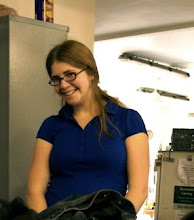Shalom from VERY hot Jerusalem! We've been suffering through a heat wave for the past week, which of course meant that the AC at HUC would break. I've been settling into the new routine of ulpan, homework, and living in Jerusalem from my new vantage point of Rehavia resident and HUC student. I also have a visitor this week, the one and only Mat Schutzer, who was such a great host when I visited him in Brussels at the beginning of the summer!
A story from our havdalah service last night. My HUC class has a lovely tradition of gathering about an hour before Shabbat ends in a park near school for singing and havdalah (the ceremony marking the end of Shabbat and the transition into the week). Yesterday, we went to a different park, with more foot traffic and people outside enjoying the slightly cooler weather as the sun went down. Anyone who has traveled with a group of NFTY teens knows the ability of guitars in public spaces to attract the attention of little kids. On this particular Saturday evening, the kids who gravitated to the eight or so guitars and our singing were a group of Arab kids and their grown-ups. (As a side note, one of my teachers at Pardes last year commented that Jerusalem's parks are one of the few public spaces where Israeli Jews and Israeli Arabs have any interaction.) We widened our circle to include them. We sang the words of the final blessing and extinguished the havdalah candle:
ברוך אתה יי אלהינו מלך העולם המבדיל בין קודש לחול, בין אור לחושך, בין ישראל לעמים, בין יום השביעי לשישת ימי המעשה. ברוך אתה יי המבדיל בין קודש לחול.
Blessed are You, Adonai our God, Sovereign of the universe, who distinguishes between the holy and ordinary, between light and dark, between Israel and the nations, between the seventh day and the six days of work. Blessed are You, Adonai, who distinguishes between the holy and ordinary.
As we sang the words "between Israel and the nations," I thought about how our circle had expanded to include those of another עם, another people, one whom, particularly within Jerusalem, is often starkly juxtaposed to be against עם ישראל, similar to the other divisions praised in the separation blessing, between light/dark, holy time/work time. Was this a division I wanted to be praising God for? Especially at a moment when the division seemed to be blurry. Yet - perhaps that is what havdalah is about. We do havdalah at the liminal moment of twilight, between light and dark, at a moment when we are trying to hold on to the peaceful holiness of Shabbat for just a few moments longer, singing just one more round of lai-lai's, before succumbing to the routine of the week. Even though we are praising these differences, and the One who Distinguishes, with the havdalah liturgy, we are still reluctant to make the separation. Just as it is said that in עולם הבא, the World as It Should Be, it will be Shabbat all the time, may it also be that when that day comes, other differences will cease to be relevant.
And a little tidbit from ulpan (intensive Hebrew language class): טיפש-עשרי=tipesh-esrei=teenager. 14, 15, etc. are ארבע-עשרי, חמש-עשרי=arba'a-esrei, chamesh-esrei, and טיפש=tipesh=stupid.
Dvar Torah for Dr. Harlan Daman’s 19th Yahrzeit
3 months ago



